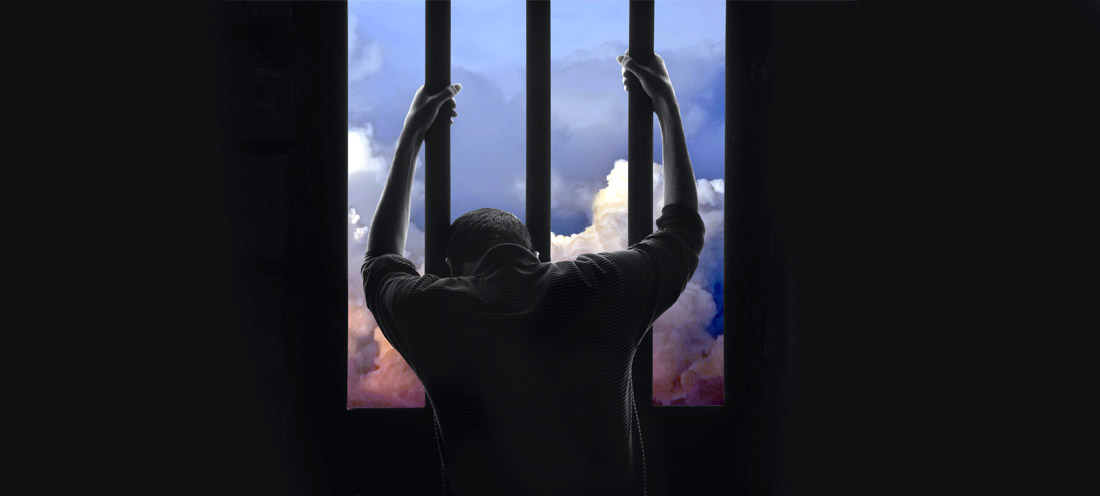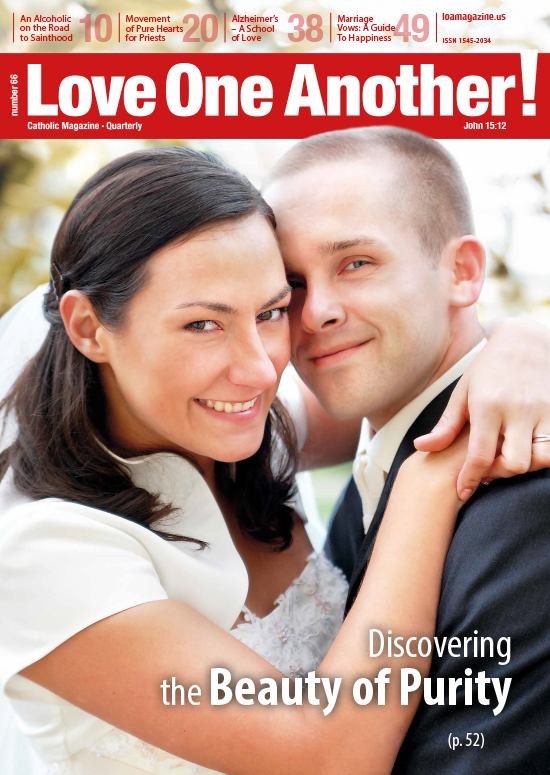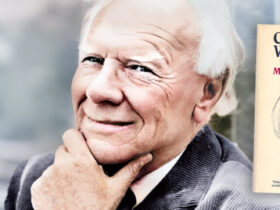God Loves Even Me

Clayton Fountain committed five brutal premeditated murders. Four of them took place behind the walls of the highest security prison in the US. Advocates of re-socialization threw their hands up in despair. Lawyers demanded the death penalty saying that no one deserved it more than he…
A childhood scarred by violence which destroyed the warmth of the family home, an adulthood in destructive military service, unsuccessful relationships, and finally, a sentence to a lifetime behind bars… And into this history of darkness shines an unexpected light which is born there where – it would appear – life has already expired… Here is God fighting to salvage this life which the legal system wanted to eradicate out of concern for the well-being of society.
One particular day of normal prison routine Clayton received a letter. A young Christian girl who recognized him from the front page of a newspaper wrote to him. In a few dozen sentences she described her conversion – a mysterious manifestation of the Gospel in her life: the meeting of the Samaritan woman with Jesus – a moment in which she heard the delicate but firm: “stop your adulteries.” This word proved to be a balsam when she was experiencing immense suffering, looking for happiness in a series of relationships without commitment. She directed the last words of her letter to Fountain: “They can lock you up in a special cell, but they can’t prevent your meeting with God – only you can do that… God is calling; so the only thing that you need to do is to listen to your heart; then ask, and keep on asking those questions. Seek, and don’t give up seeking; knock on the door, and don’t give up.” The door will open and forgiveness will be offered. It will be enough to “wash out your scarlet past and establish you pure and new in the present – free from the shackles”. The letter also contained a riddle in the postscript: “Many people want your death, but God protected your life. Why?…”
This minor unexpected loving gesture from an ordinary girl unleashed a deluge: an exchange of letters with Clayton and his setting out spiritual quest.
After many years he himself confessed: “A good Christian girl came into my life. She looked beyond what I had done and toward that which I could become. I encountered such love that I simply began to live by its precepts.”… This was first of all the experience of gradually discovering God’s love: “I discovered,” he wrote, “that God not only always loved me, but that He still loves and waits for me; to take me into his arms. All that I needed was to accept His love. With a feeling of great upheaval, shock, and awe, I finally understood that God loved even me – a man with the blood of five people on his hands and on his conscience. He wanted to meet me right where I was…”
Atonement
Fountain’s transformation began. It was protracted, but profound and sincere, based on the starting point for which he prepared himself under the watchful eye of a Catholic deacon. He described it as follows: “I expressed my regret for my sins, I asked for forgiveness, and I invited and accepted Jesus Christ into my heart and my life as my LORD and Savior.” Two years later, at Easter, Clayton was baptized and confirmed in the Roman Catholic Church. Promising “to break through the crust of death of the former man,” that day, he received the Body and Blood of Christ in Holy Communion for the first time. This was the beginning of his Holy Journey. As he himself described it, after the powerful experience of baptism, there began a stage of verification of the truth of his conversion, devotion to Jesus, “a five-year trial by fire,” “process in which God worked relentlessly to purge me of the inner ‘poisons’ that is, hatred, rage, bias, bitterness, revenge, vengeance, violence, and so forth, all those things that I had permitted to control much of my life.”…
Although the federal system still regarded Fountain as ”the principle source of threat,” his transformation – the fruit of both God’s grace and Fountain’s own efforts – became a fact. Fountain radically changed his behavior towards the guards and the other prisoners. Inspired by the Gospels, he undertook the burden of compensating his victims. He sent the widow of one of the guards whom he had murdered a certain amount of money along with an appeal for forgiveness. Sending this letter was one of the hardest things he had ever done in his life. He wrote “it is something that God has called me to do – so it must be done, even if you do not believe me.(…) The answer lies in Matthew 5:23-24 which says: ‘Therefore if you are offering your gift at the altar, and there remember that your brother has something against you, leave your gift there in front of the altar. First go and be reconciled to your brother. Then come and offer your gift.’ Although I did not immediately understand why this had such an impact on me when I read it, I anyway contemplated and prayed about it. God began revealing the path I was being called to follow, which included sending you the enclosed $800 and asking for your forgiveness. At first, I resisted God’s calling because the $800 is all the money I own and I desperately need it. I also resisted because writing this letter caused an extreme sense of fear that I have never before experienced. The more I resisted, however, the more God convicted me of what I was being called to do, and that was and is to obey and rely solely upon Him in all things. Although I am not legally required to make restitution, until – or unless – I am released from prison, God has very clearly called me to send you all I have as a partial restitution payment. While I cannot yet complete paying the remaining restitution, (…) God requires me to do what I can. (…) I am asking your forgiveness for the loss, pain, and grief you have had to endure. (…) Please know that you will always be remembered in my daily prayers. And I will, by God’s grace, continue to demonstrate my regret and repentance for all my past sins by always trying to live my life for God’s glory and by never again being responsible for the taking of another human life.”
Three desires
Faithfulness to God’s word led Clayton to an ever deeper relationship with God. A Trappist priest accompanied him as spiritual director and together they strove to discern God’s intentions for Fountain. Through this dynamic spiritual progress, he discovered all the potential possibilities which he had never before recognized in himself – he studied new languages from cassettes, took a correspondence course in theology, and, after completing his master degree with honors, applied to a doctoral studies program. This allowed him to discover a means of earning money in his cell: copying necessary texts and documents on a typewriter. A new stage began in his life: “doubtless,” he writes, “I learned to transform my penal isolation into a constructive loneliness, and my personal growth and development constantly testify to me about the full love, grace, and mercy of our Lord.”
The rhythm of life in a small cell began to approximate the rhythm of a monastic cell. Clayton discovered the beauty of contemplation. Three desires welled up in his heart: to turn his incarceration into something more spiritual and conformed to the Gospel, to introduce greater discipline, and that whatever he must do, he should do for the glory of God. Though he rarely turned on the television, he began watching the daily mass, he discovered the power of praying the psalms, and he ordered his day around a routine of hourly readings. He also undertook the practice of intercessory prayer for the other prisoners. The prison employees brought him the names of persons whom he might pray for. He wrote all the intentions down exactly, and prayed specifically for his victims and their families. “I began to feel an ever more powerful conviction,” he described, “that God was calling me to his service through Holy Orders. I resisted, hesitated, questioned, doubted, and struggled with this calling. However, in the end, I gave myself up… I accepted His call, since this was His will for me.”… He was aware of the obstacles “from diverse skepticisms through obvious prejudices and aversion towards him because of his past.” The request to grant him hermit’s status never received an answer. His application submitted to the prison authorities for conditional freedom for good behavior was rejected. Likewise, his candidacy for doctoral studies. None of the prisoner’s dreams came true.
Trial by fire
This was the moment of a major test of his faith, his real trust in God, and giving himself up completely to His will. At this time he wrote the following to his spiritual director: “I still don’t know where I’m headed, or where ultimately God is leading me (and this way I experience a blindness which I consider so very uncomfortable and depressing) but everything is all right because I don’t need to know this. As it turns out, this is what it was all about, but I could neither figure it out nor see it before I began to resist it and struggle with it (which is futile, but people feel they have to try); before I recognized that the whole point was giving up and trusting that God would still lead me through the darkness. Another equally important thing was that as long as I was still able to have powerful desires and hopes that one day I would again be free, that giving it up and submitting to God was in fact a sacrifice offered up to Him (…). The more I resisted the darkness and the struggle with it, the deeper and more terrifying it became. But the more I calmed down, accepted, and trusted, the less I was terrified and the more I was sure of myself wandering through this darkness.” The letter ended with the words: “If I have to die in prison, so be it, because God knows what is best for me and for my greatest good. (…) Anyway, God has some purpose for me or some mission to fulfill.”
During the time of these spiritual struggles Clayton received a light: “fulfill His will and not mine. This is true freedom.” He received it when he came across a book about St. Maximilian Marie Kolbe, who, as a prisoner, gave his life to save another prisoner by accepting to go willingly to his death through starvation.
A new identity
Clayton was permeated by a strong desire to do penance for his own sins. Under the guidance of his spiritual director, he undertook penitential fasts. He said “I must do penance for the sins committed by myself and by others.” He specifically wanted to make amends for those who were responsible for the growing divide between the rich and the poor.
The change in life, small gestures of love towards others, taking advantage of every moment, fulfilling his own obligations as best as he could, constancy in prayer, faithfulness to the Gospel and to God’s call even in darkness – this was his concrete personal way of responding to God’s love; the God who loved him completely and unconditionally, accepting him as he was – not because of what he had done, but in spite of it … Clayton discovered in God his new identity: child of God…
The desire to unite himself with God continued to grow within him. He made another attempt – this time he asked to be accepted as a brother of the Trappist Order. “All that I can offer is to be a witness: if you accept me, doubtless the least worthy of anyone who has ever dared to ask, then let my grave be an eternal declaration that no person is beyond forgiveness and the unifying mercy of God in Jesus Christ.” His candidacy, reviewed by the community’s council was accepted, but Clayton never learned about it. He died from unknown causes shortly before he would have been informed of the council’s decision. God had a different way to fulfill his dream of being united to Him.
The brothers interred his remains as one of their own in their cemetery. Clayton’s friend, his spiritual director of many years wrote: “He will always be for me a witness of the nature of the Good News: that even though our sins are as scarlet, God can and will make us white as snow. No matter what we do, St. Paul is right that ‘nothing can separate us from the love of Christ.’ ”
A burning message
“The flames of mercy are burning me. I desire to pour them out upon human souls,” – these are the words of Jesus that St. Faustina often heard in her soul. One thing is reflected in them: an immense longing for every human soul. If anyone feels excluded, unworthy, or rejected because of their past, Jesus assures them: “My Heart overflows with great mercy for souls, and especially for poor sinners. If only they could understand that I am the best of Fathers to them and that it is for them that the Blood and Water flowed from My Heart as from a fount overflowing with mercy. (…) Distrust of souls tears at my heart!”
St. Faustina reminds us: “Although sin is an abyss of wickedness and ingratitude, the price paid for us can never be equaled. Therefore, let every soul trust in the Passion of the Lord, and place its hope in His mercy. God will not deny His mercy to anyone. Heaven and earth may change, but God’s mercy will never be exhausted… Let no soul, even the most miserable, fall prey to doubt; for, as long as one is alive, each one can become a great saint, so great is the power of God’s grace. It remains only for us not to oppose God’s action…”
[English translation based on Diary of Saint Maria Faustina Kowalska Divine Mercy in My Soul; Marian Press Stockbridge, MA 01263 2005]
God waits for us with His mercy in the sacrament of reconciliation. He wants to forgive, heal, and strengthen. If we approach Him contritely, and, reveal our sins to him hidden in the person of the priest, he tells us as he told St. Faustina: “All your miseries have been consumed in the flame of My Love, like a little twig thrown into a roaring fire. By humbling yourself in this way, your draw upon yourself and other souls an entire sea of My Mercy. “
Source: W. Paul Jones, Cela. Historia mordercy, który stał się mnichem, Kraków 2012.
Original source W. Paul Jones , A Different Kind of Cell: The Story of a Murderer Who Became a Monk






